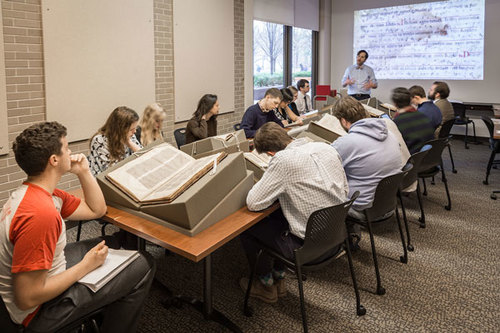Curriculum
 Professor David Gura teaches a Latin Paleography class
Professor David Gura teaches a Latin Paleography class
The Medieval Institute combines interdisciplinary course work, training in the technical skills of medieval studies, and language preparation. At the same time, students develop a scholarly identity within a single discipline. During coursework, students also develop expertise in a period or theme outside of the Middle Ages.
The Medieval Institute offers a doctoral program only. We do not accept candidates for a terminal master’s degree, but we confer the Master of Medieval Studies on students who successfully complete the first two years of requirements toward the Ph.D.
Requirements for the Ph.D.
The program requires 42 hours of course work and takes a minimum of four years, more often five (or more) years, to complete. Students must complete two years of course work in residency. Candidacy exams occur early in the third year before proceeding to the dissertation.
Students are required to take paleography and at least three courses in fields outside of their home discipline.
Candidacy Examinations
Candidacy examinations covering four fields must be completed by the mid-point of the first semester of the third year. One field covers the student's major field. The three remaining fields cover supplementary areas, within and outside the Middle Ages.
Dissertation Proposal
The dissertation proposal must be submitted shortly after Spring Break in the third year. A meeting to discuss the proposal occurs no more than two weeks after its submission.
Graduate Minors
The Medieval Institute offers four Graduate Minors: a Graduate Minor in Medieval Studies and a Graduate Minor in Byzantine Studies, both available to Master's and Ph.D. students. These minors are open to students enrolled in any graduate program in the College of Arts and Letters (Ph.D. students of the Medieval Institute are not eligible for the Minor in Medieval Studies).
Current students who have fulfilled some or all of the requirements may request the Graduate Minor retroactively by completing either the form for Ph.D. students or the form for Master's students and submitting it to the Director of Graduate Studies for the Medieval Institute.
Direct questions about the minors to the Director of Graduate Studies, Professor Jeff Wickes.
Minor in Medieval Studies
This minor provides graduate students in any department in the College of Arts and Letters (except the Medieval Institute Ph.D. program) the opportunity to develop and certify the skills that enable them to engage critically with the texts, cultures, and artifacts of Western Europe and the Mediterranean circa 500–1500. Students in this minor will engage with faculty and students outside of their home discipline, enriching their perspectives on their own research. Master’s students who complete the Minor in Medieval Studies will be eminently prepared for further doctoral research in medieval fields.
Requirements
- three courses (9 credits) hosted or cross-listed by the Medieval Institute
- experience in a medieval research language
- participation in Medieval Institute academic events
- the Ph.D. Minor further requires a significant component of manuscript-based coursework and a substantial piece of scholarship in the area of Medieval Studies
Minor in Byzantine Studies
This minor provides graduate students in any department in the College of Arts and Letters the opportunity to develop and certify the skills that enable them to engage critically with the texts, cultures, and artifacts of Central Asia, Asia Minor, and the Eastern Mediterranean circa 500–1500 (i.e., the Byzantine Empire and its zone of cultural influence). Students in this minor will engage with faculty and students outside of their home discipline, enriching their perspectives on their own research. Master’s students who complete the Minor in Byzantine Studies will be eminently prepared for further doctoral research in the area.
Requirements
- three courses (9 credits) hosted or cross-listed by the Medieval Institute
- experience in a Byzantine research language
- participation in Medieval Institute Byzantine Studies academic events
- the Ph.D. Minor further requires a significant component of manuscript-based coursework and a substantial piece of scholarship in the area of Byzantine Studies
For further details on all minors, see the current Graduate Handbook.
Questions about our program?
For more detailed information see the most current Graduate Handbook or go our Admissions FAQ. You can also consult the Graduate School's Bulletin of Information. For further questions, email the Director of Graduate Studies, Professor Jeff Wickes.